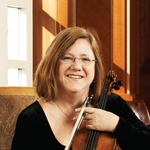Nearly 100 ICSOM delegates, officers and orchestra members, Local officers, AFM officers and staff, Players Conferences representatives, and attorneys were on hand August 25 to 29, for the 53rd ICSOM Conference at the Sonesta Philadelphia Hotel, and the total would have been even greater if two member orchestras, the Boston and San Francisco Symphonies, hadn’t been on tour in Europe. The 2015 Conference was a celebration of education, advocacy, and diversity, so there was no title given to this year’s conference. We were inspired by national leaders as well as members of ICSOM’s own orchestras, and we found new ways to engage the community within the host city. We learned, we were entertained, and now we return to our orchestras and locals with important information to share.
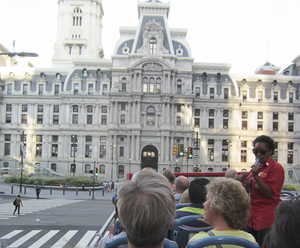
Photo credit: Eric Arbiter
The Philadelphia Orchestra (having just returned from a three-week residency in Saratoga Springs, NY) along with Local 77 hosted a wonderful and varied ICSOM conference. Delegates and guests were able to tour the Kimmel Center, which is the home of the Philadelphia Orchestra, followed by a lovely mixer on the Doubletree Hotel’s patio overlooking the Center and the Academy of Music. Another evening, after the daily sessions had been completed, Local 77 provided a double-deck bus to view some of Philadelphia’s many landmarks and historical sites, including the Liberty Bell and the Art Institute, with the chance to run up the 72 stairs and pose by the Rocky statue! The bus also drove past Betsy Ross’s home, the building where Thomas Jefferson wrote numerous drafts of the Declaration of Independence, and the home used in the television show “It’s Always Sunny in Philadelphia”—and the weather during the week was spectacular!
The ICSOM Governing Board had, for a number of years, discussed scheduling an event or service in the host orchestra’s city. With the assistance of Philadelphia Orchestra cellist Gloria dePasquale, the afternoon before the conference officially began, ICSOM delegates, officers and members partnered with Philadelphia Orchestra musicians to provide music, greeters and servers at Broad Street Ministry, which is right across the street from the Kimmel Center.
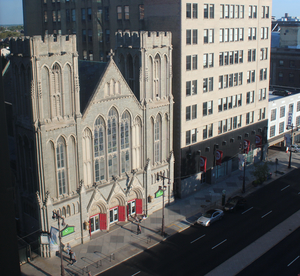
Broad Street Ministry seen from the Kimmel Center
Photo credit: Laura Ross
This beautiful old sanctuary, with artwork hanging from the rafters, supplies hundreds of homeless in Philadelphia with meals, clothing, and even provides them with a mailing address so they can receive benefits and set up bank accounts. It is also dedicated to fostering the arts and providing a medium to raise social consciousness. Musicians from Atlanta, Chicago Lyric, Dallas, Fort Worth, Hawaii, Kansas City, the Kennedy Center, Los Angeles, Minnesota, Nashville, New Jersey, Philadelphia, Pittsburgh, and Utah performed and served during the dinner hour.
The next morning, following a new delegate breakfast for nearly one-third of the delegates, the conference began with stirring addresses by ICSOM Chairperson Bruce Ridge and ICSOM President Brian Rood, who stepped down at the end of the conference after serving as ICSOM president for 12 years. Brian continues to serve as an AFM-EPF Trustee, and recently agreed to serve as the new chairman of the ICSOM Electronic Media Committee.
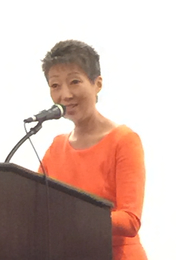
NEA Chairman Jane Chu
Photo credit: John Koen
The conference keynote speaker was Dr. Jane Chu, the 11th and current Chairman of the National Endowment for the Arts (NEA). ICSOM forged a relationship with the NEA in the mid-1970s, and a number of ICSOM appointees served on the NEA’s Music Panel. Representatives from the Music Panel addressed delegates between 1976 and the early 1990s, but Chu is the first NEA Chairman to address the ICSOM conference. Born in Oklahoma to Chinese immigrants, she spoke about the importance of music in her life as it helped her deal with the two different cultures and perspectives at work in her family. Music provided solace when her father died, as well as a social life and peers in the bands and orchestras in which she played, and it taught her to collaborate and honor the ideas of others. Chu talked about her role as NEA chairman and discussed the linkage between the arts and improvements in test scores, better attendance, and higher graduation rates. In closing, she reminded attendees that the NEA is 50 years old; to celebrate, people are encouraged to share with the NEA (http://www.arts.gov) how the arts have impacted their lives.
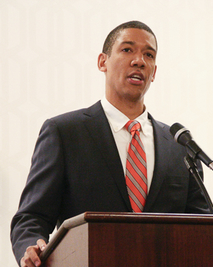
Weston Sprott
Photo credit: Eric Arbiter
Weston Sprott, second trombonist with the Metropolitan Opera Orchestra, followed Chu’s address with his own case for increased arts and music education. Sprott is a teacher in the Juilliard School’s Music Advancement Program (MAP) which offers lessons to talented kids that are under-represented in American performing arts, between ages 8 to 14. He and one of his students are featured in a new documentary Some Kind of Spark. During his address, Sprott said music education teaches us who we are and what we want. He spoke about music’s power, relating it to his understanding of the Civil Rights movement that he said was informed more by Sam Cooke’s “A Change is Gonna Come” than by his personal reading or by his mother’s experience as a member of her high school’s first integrated class.
Randy Whatley returned for his third ICSOM conference to discuss lessons he and musicians have learned in the past few years of lockouts and potential job actions. He suggested timelines to begin, how to involve the musicians in various activities, when to use and not use social media to get the word out to the community, developing multiple messages and strategies to achieve established goals, and the importance of continuing these activities even after the crisis has passed.
Joseph Conyers, the Philadelphia Orchestra’s assistant principal bassist, discussed his mother’s desire to be an opera singer, how she did what she could with limited resources, and how she would enable the next generation to achieve what she couldn’t. His organization Project 440 grew out of a concern for the disappearance of school music programs, and strives to provide young musicians with career and financial development assistance, along with training to become performers and educators capable of providing learning opportunities to children and adults. You can read more about Project 440 in the July 2015 issue of Senza Sordino.
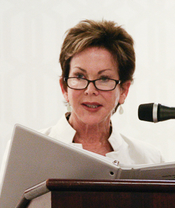
FMCS DirectorAlison Beck
Photo credit: Eric Arbiter
Federal Mediation and Conciliation Service’s (FMCS) newly appointed (and first woman) Director Allison Beck, titled her address “Back to the Future at FMCS – A 20th Century Solution for the 21st Century Workplace”. In her comments, she likened the current treatment of musicians to the past treatment of factory workers. She pointed specifically to the Metropolitan Opera Orchestra negotiations, the double lockout of the Atlanta Symphony, and the historic 16-month lockout of the Minnesota Orchestra musicians, which, thankfully, did not end with the replacement of all the workers as the 1981 PATCO (air traffic controllers) strike had. Beck compared early 20th century workers who had no workplace protections—wages, hours, health and safety—to workers in the “sharing economy” that makes services available at the tap of an app, where employment is once again unregulated and extreme, and employees are overworked. She outlined programs being implemented within FMCS, such as the training program for negotiation preparation requested by Ford Motor Company and the United Auto Workers. She also noted recent successful negotiations in Cincinnati, San Francisco, and Utah, adding that the Minnesota Orchestra appears to be on a new path that includes respect. There was levity as well when she pointed out faces in the audience that were now smiling at her, rather than scowling, because these same musicians and local and federation officers had been involved in the Metropolitan Opera Orchestra negotiations and Atlanta Symphony lockout in 2014, when Beck served as mediator and FMCS advisor.
ICSOM Counsel Susan Martin and her partner Jennifer Knoll, led another rousing and informative session of Delegate Duel. Delegates, along with AFM staff and local officers, were divided into groups and vied for high scores as they demonstrated their understanding of the foibles of labor law. AFM President Ray Hair gave a presentation on the history of electronic media convergence. That was followed by an explanation of the newly ratified Integrated Media Agreement by AFM-SSD Electronic Media director Debbie Newmark, current ICSOM Electronic Media Committee (EMC) chair Brian Rood, and former EMC chair Matt Comerford.
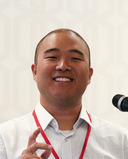
John Beder
Photo credit: Eric Arbiter
Delegates heard about a documentary film, currently titled Composed, which follows up on a 1987 ICSOM survey about performance anxiety. Filmmaker John Beder exhibited portions of the film and told delegates of an upcoming survey that ICSOM’s musicians will be encouraged to fill out, to provide further information and possible additional interview candidates for the film. [The survey is currently open only to active members of ICSOM orchestras, and is available at https://goo.gl/MsiaSE. A future version will be open to the public.]
AFM & Employers’ Pension Fund Trustees Brian Rood and I updated delegates on the state of the AFM-EPF, and the leaders of ROPA, OCSM, TMA and RMA addressed the delegates. The Symphonic Services Division agreed to a new format this year; delegates had been asked to submit questions for a Q&A session moderated by member at large Jennifer Mondie.
In a jam packed conference, it’s always important to try and combine learning with fun. This year there were two different breakout sessions. The first was an opportunity for musicians to ask specific questions about recording projects and other opportunities available under the newly negotiated Integrated Media Agreement. The other session was a mock arbitration in which delegates played the roles of musician, management, witnesses, union and employer attorneys, and arbitrators for an actual case provided by Susan Martin. Other attorneys attending the conference were recruited to assist and advise each side of the argument. Of course these scenarios bring out the actor in many who relish the opportunity to play the poor abused musician or the pompous manager. Eric Arbiter, our very talented photographer who happens to double as a bassoonist in the Houston Symphony, took some wonderful pictures of these workshops that can be viewed in the photo gallery on the ICSOM website. [http://www.icsom.org]
ICSOM conferences also include town meetings that are private discussions between the delegates and governing board. These discussions make us realize that issues we deal with are also issues for other orchestras. One of the top issues discussed was decibel levels onstage, especially during pops shows with amplified guest artists; it’s a huge problem for all musicians, including those in the top orchestras, who are trying to find solutions before we all lose our hearing.
Attorneys Mel Schwarzwald and his associate Joe Porcaro discussed negotiation information requests and confidentiality agreements. They also displayed and discussed various models of wages and benefits comparisons that can be very effective during bargaining—effectiveness that Schwarzwald demonstrated during the MET negotiations in 2014.
Delegates dealt with bylaw changes to clarify the ICSOM elections process and passed a number of resolutions that can be found in this issue. [See page 6.]
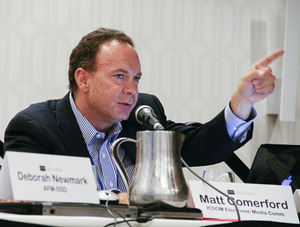
ICSOM President Emeritus Brian Rood
Photo credit: Eric Arbiter
Utah Symphony’s George Brown was elected ICSOM President by acclamation, replacing Brian Rood, who was named ICSOM President Emeritus. I was re-elected ICSOM Secretary by acclamation, beginning my 14th year in this position. National Symphony’s Jennifer Mondie was re-elected to a two-year term as Member at Large, and Paul Austin from the Grand Rapids Symphony was elected to the two-year Member at Large position vacated when Matt Comerford chose not to run for re-election. The next AFM triennial convention in Las Vegas will be held in 2016, which requires the election of a 3rd delegate chosen from amongst the Members at Large. Jennifer Mondie was elected as AFM Convention Delegate and Meredith Snow was elected as alternate. When Bruce Ridge and George Brown were elected to the offices of Chairperson and President, they were also elected to serve as AFM Convention Delegates.
The success of a conference is due in large part to those helping out behind the scenes. We are grateful for all the assistance we had during the conference, and in particular, give thanks to the Philadelphia Orchestra musicians for their support and participation. Special thanks to ICSOM delegate John Koen for his leadership during the conference, to alternate delegate Gloria dePasquale who worked with Governing Board members to set up the volunteer event at Broad Street Ministry, and to conference coordinator Jonathan Beiler and assistant coordinator Tom Reel for their work during the conference that assured we didn’t miss a step. And finally, our thanks to Local 77’s officers and to President Joe Parente for their generosity and hospitality.
The 2016 ICSOM conference will be held August 24-27 at the Loews Madison Hotel in Washington, DC. Our hosts will be the Kennedy Center Opera House Orchestra, the National Symphony Orchestra, and Local 161-710.


